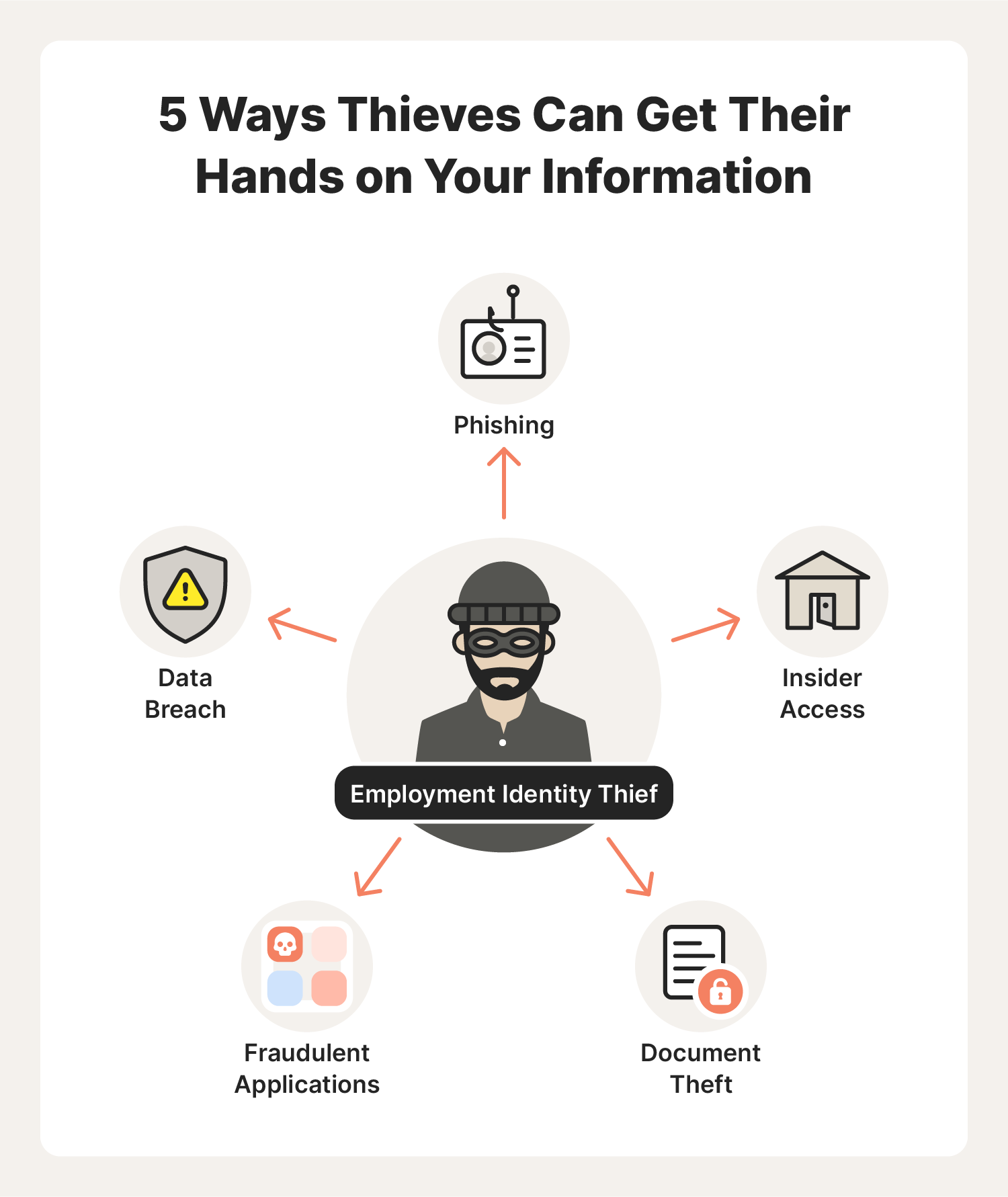Employment identity theft is when a bad actor steals your Social Security number or other personal identifying information (PII) to impersonate you on a job application. It can be tough to discover if someone steals your identity for work purposes because the effects often aren’t immediately obvious. We’ll take a deep dive into employment identity theft, including how it occurs, what to do if it happens to you, and the steps you can take to help prevent it, like using LifeLock’s identity theft protection service.
How does employment identity theft occur?

Employment identity theft occurs when a thief uses your personal information to obtain work authorization. This info can include your Social Security number, name, date of birth, and more.
Employee identity theft is illegal, but that doesn’t often stop it from occurring. About 8% of all identity theft complaints are from employment-related fraud. It can lead to hassles for you, leaving you to deal with covering for fraudulent employment history, working through income tax headaches, and even dealing with an IRS audit.
Generally, there are a few different ways that employment identity theft can happen:
- Data breaches: Identity thieves might gain access to a company’s database that stores sensitive employee information. If you don't adequately protect this information, it can get stolen and used for fraudulent purposes.
- Insider access: Sometimes, employees with authorized access to sensitive personal information may abuse their privileges and use that information for fraud, including creating fake identities for employment.
- Phishing: Identity thieves can use phishing emails, phone calls, or other scamming tactics to try and trick you into providing your personal information. These thieves might pose as potential employers or human resource representatives and then request sensitive info to misuse.
- Document theft: If your identifying documents, such as a driver’s license, birth certificate, or Social Security card are lost or stolen, a bad actor can use them to establish false identities and gain employment.
- Fraudulent applications: Identity thieves may submit job applications using your identity, fabricating some personal information to make it appear legitimate.
Once a thief successfully gains employment under someone else’s identity, they may receive paychecks or benefits meant for that person. This harms their financial and employment records and results in legal complications and tax issues.
How to prevent employment identity theft
This type of identity theft can devastate your employment history and your name.
You may face tax audits, lost tax refunds, and errors on permanent government records after incorrect employment history information gets reported to the Social Security Administration (SSA).
Thieves could use your identity for non-work-related purchases like medical services, home utilities, and lines of credit. And if you apply for a new job, your prospective employer may think you’re misleading them with an inconsistent employment history. It can take years to unravel the effects of employment identity theft.
The best defense is a good offense, so here are the best ways to proactively prevent employment identity theft from occurring in the first place.
- Keep your personal information a secret: The best way to stop thieves is to keep your personal identifying information confidential. Store your Social Security card in a secure location, and use a VPN whenever you share personal information on public Wi-Fi.
- Watch out for phishing scams: Thieves may try to steal your information by tricking you with an email or a text that seems like it’s coming from a trusted contact. Watch for spelling and grammar mistakes that might clue you into the scam.
- Limit personal information on any work computers: Any data you store on a work computer is not private. Limit what you share on work and public computers to avoid bad actors finding sensitive information.
- Use a VPN on public networks to protect yourself: Use a virtual private network (VPN) to encrypt any data you send or receive on a public Wi-Fi network. VPNs also mask your IP address to make retrieval of your personal information even more difficult.
How employers protect employees from identity theft
You’re not alone in the fight to guard your identity against thieves. Here are some of the easiest ways employers can protect employees from identity theft.
- Storing data securely: Strong security measures to protect employee data are a great first step for identity theft protection for employees. These best practices include firewalls, encryptions, access controls, and regular updates to security software.
- Training employees to manage security risks: Employers can educate employees about the risks of identity theft and provide training on identifying and reacting to phishing emails and other fraudulent activity.
- Conducting thorough background checks: Background checks on potential employees, especially those who will handle sensitive data or access employee records, is a key best practice for preventing identity theft.
Employers bear some responsibility for making sure they protect sensitive information and don’t hire fraudulent employees. But that doesn’t mean you should let down your guard—keep your personal information protected no matter where you use it.
How to find out someone is committing employment fraud with your information + what to do next
If you’re suspicious about someone committing possible employment-related identity theft, like using your Social Security number to work, it’s better to act on your suspicion than leave the situation alone. There are several steps you can take to investigate and address the situation.
- Review your credit reports: Reach out to the major credit reporting agencies for copies of your credit reports. When you receive them, look for any unfamiliar or unauthorized accounts, loans, or background checks related to employment. If you spot any of these, it might be a sign of fraud.
- Monitor your financial statements: Review your bank and credit card statements and any other financial accounts as often as possible for unauthorized transactions or suspicious activity.
- Contact the IRS: Inform the IRS of your suspicion and request an identity protection PIN for added security.
- Reach out to the SSA: Contact the Social Security Administration to ask about any suspicious activity related to your SSN, like unauthorized employment.
- Notify your employer: Inform your current or previous employers, especially if you receive tax forms from unknown employers. They can investigate the matter internally, determine if employment fraud or a tax scam has occurred, and take appropriate action.
- File a police report: File a police report with your local law enforcement agency for the theft. Provide them with all the relevant details and documentation you have.
- File an identity theft report: Contact the Federal Trade Commission (FTC) to file an identity theft report. The FTC provides resources and assistance for people whose identities have been stolen.
- Freeze your credit report: Consider contacting the major credit reporting agencies to place a fraud alert or credit freeze on your credit reports. A fraud alert notifies potential lenders to take extra precautions when verifying your identity, making it difficult for identity thieves to open new accounts.
If you navigate these steps, save your future self some time and trouble. Keep detailed records of all your communications, including dates, names, and reference numbers. By taking quick action and keeping good records, you can help to resolve the situation quickly and effectively.
Take the necessary steps to help protect your identity
The workplace is somewhere you expect to focus on your career goals. However, you should keep your wits about you when handling your personal info to help protect yourself against scams and fraud.
For an added layer of protection against employer identity theft, LifeLock Standard can proactively search for Social Security and other identity theft alerts, help limit public exposure of your personal information, and even keep an eye out for leaks on the dark web.





